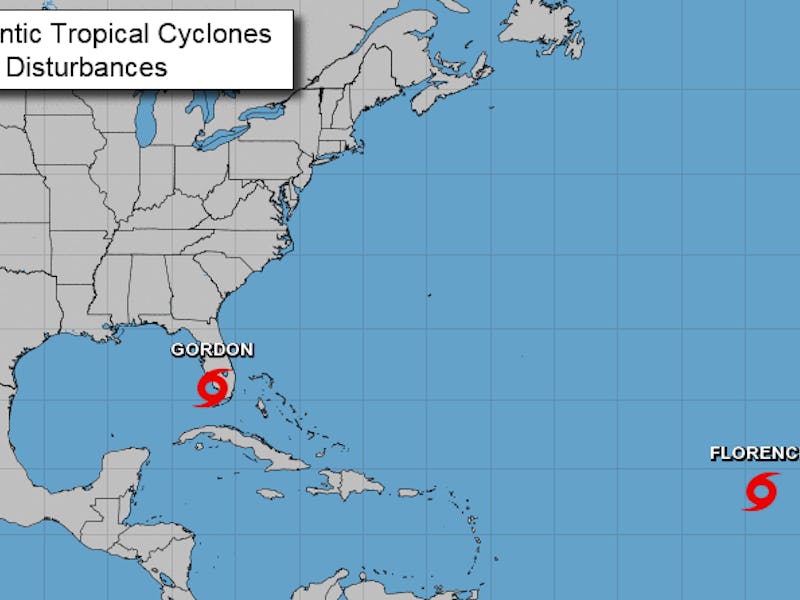What Is a Tropical Cyclone? Why Tropical Storm Gordon Isn't Too Scary Yet
Here's how the term is defined by experts.

People in Florida and the Gulf Coast may be used to battening down the hatches, but tropical storms and hurricanes are still something people along the coast — and in places like Hawaii, which just experienced Hurricane Lane — need to prepare for no matter what. And Tropical Storm Gordon is no different.
Gordon headed towards the central United States Gulf Coast on Labor Day, according to the National Hurricane Center. In addition to the tropical storm classification, the NHC also issued a “Potential Tropical Cyclone” Advisory before the storm was named. But what exactly is a tropical cyclone, and is it as scary as it sounds?
Cat Conner, of New Orleans, Louisiana, tells Inverse she is “not particularly concerned” with Tropical Storm Gordon. She said she’ll “probably batten down the hatches” at work on Tuesday, as she is still planning on going in despite the storm, and that while people in the area are taking Gordon seriously, “we all generally stay prepared for a tropical storm up to a category 1 storm.” (Referring to the Saffir-Simpson Hurricane Wind Scale, which uses a scale of one to five.)
But just because people in the area may be used to tropical storms and hurricanes, that doesn’t mean some of the terms surrounding the storms seem any less scary without context.
What Exactly Is A Tropical Cyclone?
If you’re imagining a terrifying tornado in the middle of a hurricane when you hear the term “tropical cyclone,” your instincts are a little bit off. NASA’s Global Precipitation Measurement Mission actually has a specific definition of what a tropical cyclone is, and it will hopefully put a lot of minds to rest.
NASA’s Global Precipitation Measurement Mission describes a tropical cyclone as, “the generic term for a non-frontal synoptic scale low-pressure system over tropical or sub-tropical waters with organized convection (i.e. thunderstorm activity) and definite cyclonic surface wind circulation (Holland 1993).”
Forbes points out that a tropical cyclone is really just the generic term used to describe different tropical “low” pressure systems, including tropical storms, hurricanes, typhoons, cyclones, and more. It’s not meant to freak people out with a scary title, it’s merely a way of labelling these systems so people in their path can be prepared.
What’s the Difference Between a Tropical Cyclone, A Tropical Depression, or Tropical Storm?
A tropical cyclone is “a warm-core non-frontal synoptic-scale cyclone, originating over tropical or subtropical waters, with organized deep convection and a closed surface wind circulation about a well-defined center,” according to the National Hurricane Center.
The NHC defines a tropical depression as “a tropical cyclone in which the maximum sustained surface wind speed (using the U.S. 1-minute average) is 33 kt (38 mph or 62 km/hr) or less.” So it is still considered a tropical cyclone.
A tropical storm is also defined as a tropical cyclone by the NHC, but a tropical storm is labelled as such when the strongest sustained surface wind speeds range “from 34 kt (39 mph or 63 km/hr) to 63 kt (73 mph or 118 km/hr).” After it hits 73 mph, these storms are considered hurricanes.
Florida coast in Bradenton, FL, before Tropical Storm Gordon's arrival.
“It’s not even raining.”
In any case, people who spoke with Inverse who are in Tropical Storm Gordon’s path sound fairly prepared for the storm, and at its current strength, they aren’t particularly worried about it.
Sasha Lioce, a Product Sales Manager for Girl Scouts of Gulfcoast Florida, is in Bradenton, Florida, and told Inverse around 4:00 p.m. Eastern that the storm’s eye was “about an hour and a half away” at that time. “We are literally driving around outside,” she tells Inverse. “It’s not even raining.”
So as scary as a tropical cyclone may sound, it actually has a totally mundane definition, and until and unless Gordon hits hurricane strength, many people on the Gulf Coast may just go about their lives as usual.